Selçuk
Selçuk is a municipality and district of İzmir Province, Turkey.[2] Its area is 317 km2,[3] and its population is 38,151 (2022).[1] The town Selçuk is located 2 kilometres (1 mile) northeast of the ancient city of Ephesus, that was once home to the Temple of Artemis, one of the Seven Wonders of the Ancient World.
Selçuk | |
|---|---|
District and municipality | |
 | |
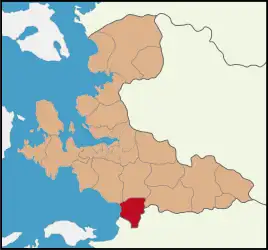 Map showing Selçuk District in İzmir Province | |
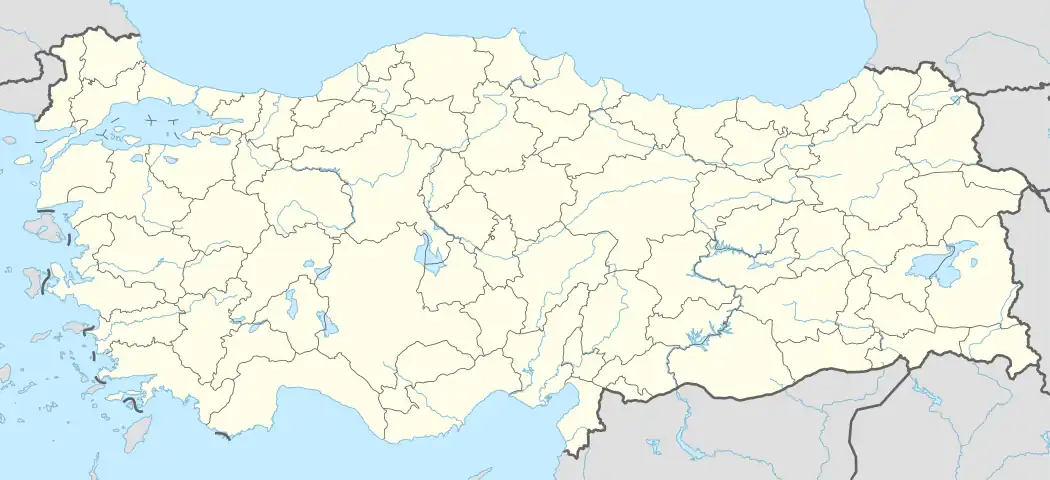 Selçuk Location in Turkey 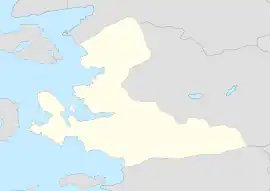 Selçuk Selçuk (İzmir) | |
| Coordinates: 37°57′N 27°22′E | |
| Country | Turkey |
| Province | İzmir |
| Government | |
| • Mayor | Filiz Ceritoğlu Sengel (CHP) |
| Area | 317 km2 (122 sq mi) |
| Population (2022)[1] | 38,151 |
| • Density | 120/km2 (310/sq mi) |
| Time zone | TRT (UTC+3) |
| Postal code | 35920 |
| Area code | 0232 |
| Website | www |
Selçuk is one of the most visited tourist destinations within Turkey, known for its closeness to the ancient city of Ephesus, House of the Virgin Mary, and Seljuk works of art. The 6th century Basilica of St. John the Apostle, which, some claim, is built on the site of the Apostle's tomb, is also inside the town. Procopius said that the basilica was a most sacred and honoured place in Ephesus. It was severely damaged in the invasion of Selçuk Turks in 1090. The place was excavated in 1927, and Pope Paul VI paid it a visit and prayed there.[4]
History
Its previous Greek name, Agios Theologos (Άγιος Θεολόγος), referred to John the Theologian, because emperor Justinian I had erected there a basilica in honour of the saint. Ayasoluk is a corrupted form of the original name.[5] In the 14th century, it was the capital of the Beylik of Aydin, and visited by Ibn Battuta. He noted, "The congregational mosque in this city is one of the most magnificent mosques in the world and unequaled in beauty."[6] Under the Ottoman Empire, it was known as Ayasoluk. In 1914, it was renamed Selçuk after the Seljuk Turks who first led incursions into the region in the 12th century.
It was a township in Kuşadası district till 1957, when it became a district itself. Its neighbours are Torbalı from north, Tire from northeast, Germencik from east, Kuşadası from south, Aegean Sea from west and Menderes (formerly Cumaovası) from northwest.
In 1921, after the capture of the village by the Greek forces, the village had a total population of 600, ethnographically consisting of 580 Greeks, 10 Turks and 10 Armenians.[7]
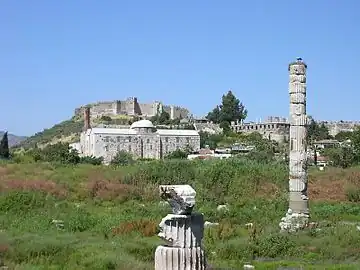
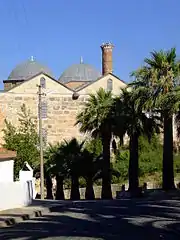
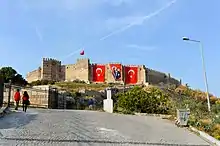
The old quarter of Selçuk retains much traditional Turkish culture. Ayasuluk Hill dominates the surrounding area, with several historical buildings on its slopes, including the İsa Bey Mosque built by the Aydinids in 1375, and the Grand Fortress. The hill itself is part of Ephesus UNESCO World Heritage Site.[8]
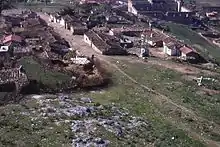
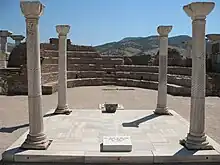
Ephesus Beach (Turkish: Pamucak) is one of the longest beaches (12 km) in Turkey and hosts five large hotels.
Composition
There are 14 neighbourhoods in Selçuk District:[9]
Sport
The youth football teams of the İzmir-based sports club Altınordu S.K. play their home matches in the Altınordu Selçuk-Efes Football Complex, which is located WSW of Selçuk. With five football fields, the venue is the largest in İzmir Province.[10]
Notable people
- Bülent Cevahir (1992–), footballer
- Hafsa Hatun (before 1380 – after 1403), wife of Sultan Bayezid I of the Ottoman Empire
International relations
References
- "Address-based population registration system (ADNKS) results dated 31 December 2022, Favorite Reports" (XLS). TÜİK. Retrieved 12 July 2023.
- Büyükşehir İlçe Belediyesi, Turkey Civil Administration Departments Inventory. Retrieved 12 July 2023.
- "İl ve İlçe Yüz ölçümleri". General Directorate of Mapping. Retrieved 12 July 2023.
- Bruce, pp. 340, 341
- Bruce F.F., " St John at Ephesus", The John Rylands University Library, 60 (1978), p. 339
- Battutah, Ibn (2002). The Travels of Ibn Battutah. London: Picador. pp. 111, 310. ISBN 9780330418799.
- Νοταράς, Μ., "Εις την Ιωνίαν Αιολίαν και Λυδίαν πριν πενήντα χρόνια", Athens, December 1972, p. 95.
- "Ephesus". UNESCO World Heritage Centre. Retrieved 16 February 2020.
- Mahalle, Turkey Civil Administration Departments Inventory. Retrieved 12 July 2023.
- Ertaç, Gürkan (4 May 2014). "'Önce Tesis' Dedi". Yeni Asır (in Turkish). Retrieved 2 October 2015.
- "Kardeş Şehirlerimiz". selcuk.bel.tr (in Turkish). Selçuk. Retrieved 19 January 2020.
External links
- "Selçuk" (PDF) (in Turkish). İzmir Chamber of Commerce. 2007.
- Selçuk District, governmental site
 Selçuk travel guide from Wikivoyage
Selçuk travel guide from Wikivoyage- Selcuk places to visit
- Pictures of Selçuk
- Images of Selçuk Ayasoluk
- Selçuk Guide
- Şirince Information Guide
- Exploring St Johns Basilica and other ruins
- Alert - Travel scam operating in Selçuk
